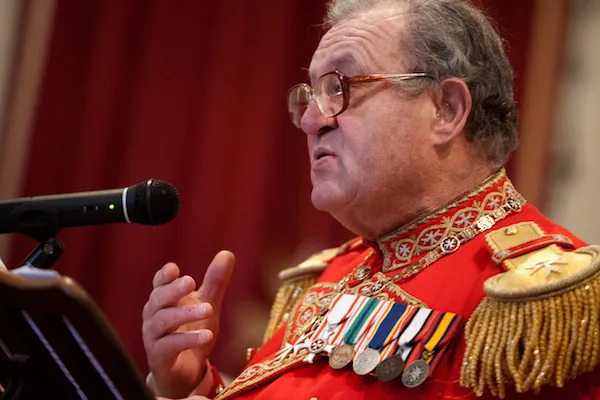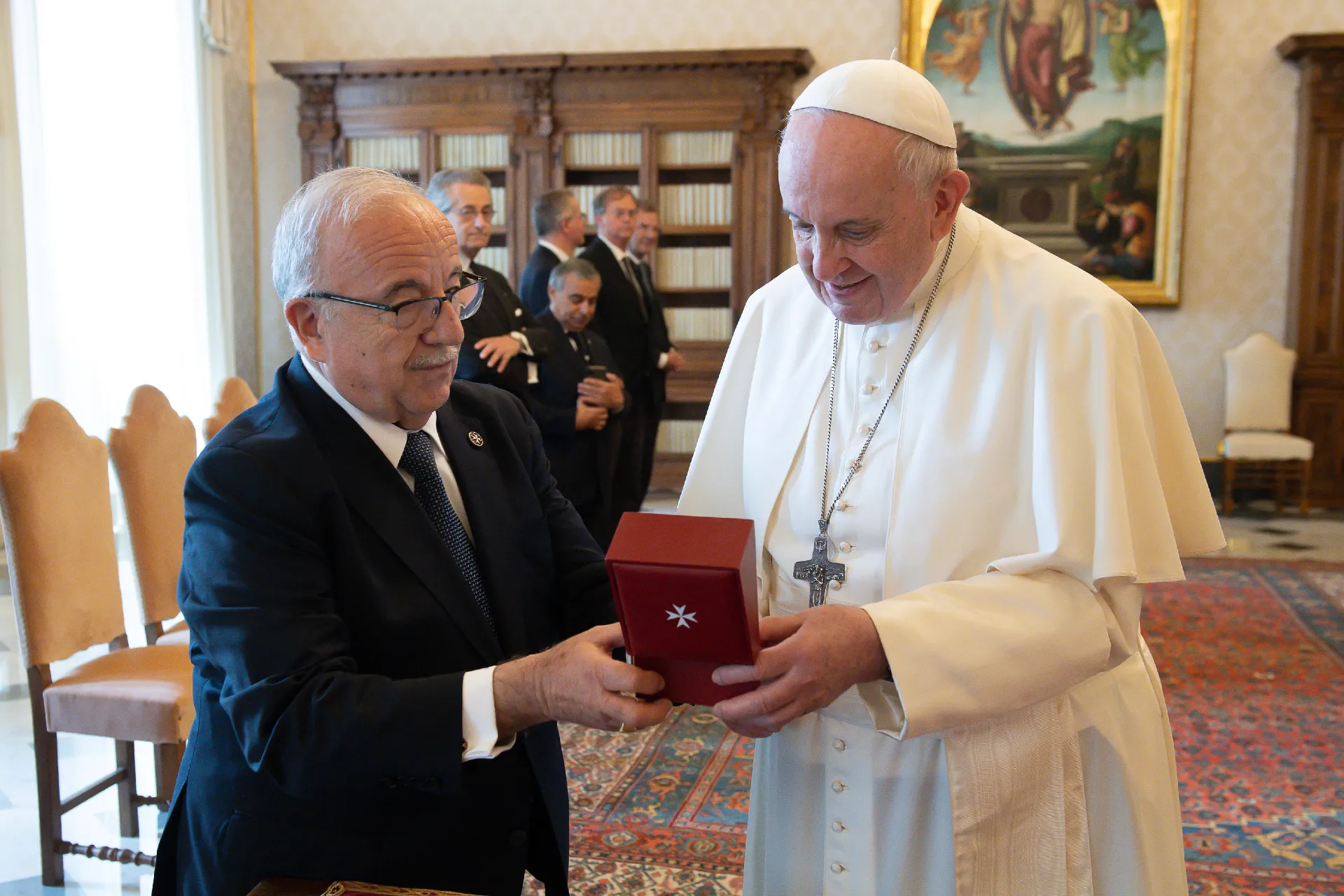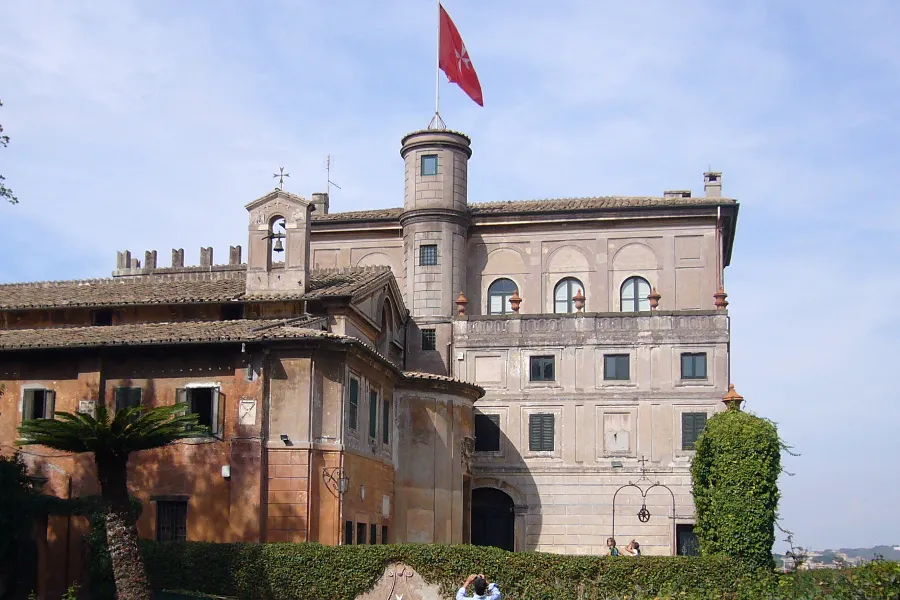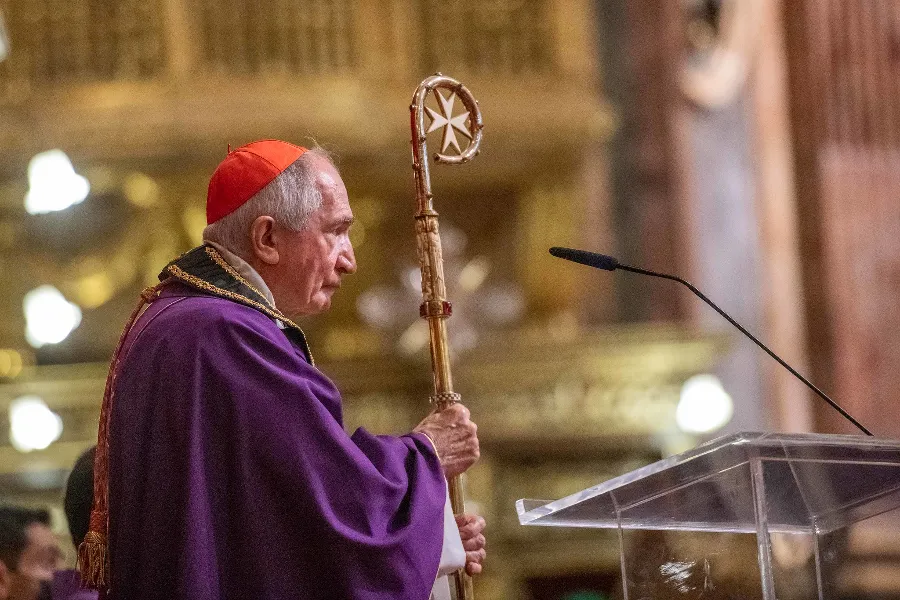If the Vatican can destroy SMOM's sovereignty by fiat, why can't Italy likewise destroy the Vatican's sovereignty?
From the National Catholic Register
By Andrea Gagliarducci/CNA
Fra’ Luzzago, whose official title is Lieutenant of the Grand Master, added that “this sovereignty has enabled the Order of Malta to build up its vast network of international relations through its diplomacy committed to the constant support of its centuries-old humanitarian mission.”
 |
Flag of the Works of the Sovereign Military Order of Malta
flying over the Villa del Priorato di Malta.
(photo: AM113 / Shutterstock) |
ROME — Fra’ Marco Luzzago, the Lieutenant of the Order of Malta, delivered his annual address to the diplomatic corps accredited to the order on Jan. 11, five years into a reform process launched by Pope Francis.
Standing at a podium at the Magistral Villa in Rome, he hinted at some issues regarding the sovereign status of the body known as the Sovereign Military Order of Malta.
Fra’ Marco Luzzago. . Order of Malta.
Recalling at length the works of mercy performed by the order’s members in the past year, he stressed towards the end of his speech that “what you have heard so far has been possible above all thanks to the sovereignty of the order, a founding element of our constitution.”Fra’ Luzzago, whose official title is Lieutenant of the Grand Master, added that “this sovereignty has enabled the Order of Malta to build up its vast network of international relations through its diplomacy committed to the constant support of its centuries-old humanitarian mission.”
He concluded: “The work on the reform of our constitutional charter has continued over the past year and is at an advanced stage. Further meetings are planned in the coming weeks to analyze further and examine the outstanding issues.”
“An extraordinary general chapter will be convened to approve the reform when as much consensus as possible has been reached on all the main issues.”
This final passage is crucial to understanding the present situation. In November 2020, Pope Francis named Cardinal Silvano Maria Tomasi as his special delegate to the order. In October 2021, the pope gave Tomasi sweeping new powers to carry forward reform of the 1,000-year-old institution.
But a draft of the order’s revised constitution is proving controversial among some Knights of Malta, since it would make the order “subject to the Holy See.” This means that the body would lose its independence and hence its diplomatic status.
The final stage of the reform is coming after a long and often bitter debate, which broke out in 2017 after the resignation of Fra’ Matthew Festing as Grand Master of the order. (Festing died in November at the age of 71.)
To grasp the current crisis, it is important to understand the order’s unique identity and distinctive structure.
The order has diplomatic relations with more than 100 states and permanent observer status at the United Nations. Although it possesses no real territory, it has the hallmarks of sovereignty, such as its own official currency, postage stamps, and vehicle registration plates.
The order’s members belong to one of three classes.
The First Class consists of the Knights of Justice or Professed Knights, as well as Professed Conventual Chaplains, who take the religious vows of poverty, chastity, and obedience. They are defined as religious but not required to live in community.
The Second Class is composed of Knights and Dames in Obedience, who promise to strive for Christian perfection in the spirit of the order.
The Third Class comprises lay members who make neither vows nor promises, but are committed to living a fully Catholic life according to the order’s principles.
Only First Class knights who descend from a family of four quarters of nobility are eligible to be elected as the Grand Master, the order’s religious superior and sovereign.
The Grand Master oversees the order with the help of a body called the Sovereign Council, whose members are elected for five-year terms by the order’s General Chapter.
Members of the Sovereign Council include the Grand Chancellor, who oversees the order’s 133 diplomatic missions, and the Grand Hospitaller, responsible for the order’s humanitarian initiatives.
The order has three different types of national institutions spread around the world: six grand priories, six sub-priories, and 48 associations.
Now let’s look at how the tensions within the order exploded into a public crisis. |
| Albrecht von Boeselager. Daniel Ibáñez/CNA. |
Clashes Within the Order
In 2014, the Chapter of the Order of Malta decided not to re-elect Jean-Pierre Mazery as the order’s Grand Chancellor. Instead, Albrecht von Boeselager, previously the order’s Grand Hospitaller, was elected to the position. There was also a significant shift in that election, as none of the Italian members previously in critical positions were re-elected.
This shift had notable consequences. In 2016, Fra’ Matthew Festing, the then Grand Master, asked Boeselager to resign in the presence of Cardinal Raymond Burke, the order’s cardinal patron (the pope’s representative to the order). The request was tied to reports about the alleged distribution of condoms in Burma by Malteser International, the order’s relief agency.
Fra’ John Edward Critien was appointed interim Grand Chancellor. But several knights appealed against the decision, arguing that the situation in Burma had been resolved and Boeselager was not even Grand Hospitaller at the time.  |
| Fra’ Matthew Festing, the Order of Malta’s 79th Grand Master, addresses the diplomatic corps in January 2015. British Association of the Order of Malta. |
The Pope decided to establish a commission to clarify the situation. The members of the commission were the then Archbishop Silvano Maria Tomasi, Lebanese leader Marwan Sehnaoui, canon law expert Father Gianfranco Ghirlanda, former Grand Chancellor Jacques de Liedekerke, and Marc Odendall, a Swiss-German banker who at the time also sat on the Vatican Financial Intelligence Authority’s board.
Recalling that time, Odendall told CNA via email: “We got all the high charges, plus all the important presidents, that represented the associations doing the 90% of the works of the order with 10% of members. We also received hundreds of support letters.”
“We finalized our report and recommended the consensus views among those, inter alia, to ask Fra’ Festing to go, not as a head of state, where the pope should not intervene, but as a head of the religious, since he had asked Boeselager to resign under his promise of obedience and had dismissed him for refusal.”
“He had not followed the course before the Sovereign Council because he would not have had a majority. So, Festing had to resign because he had broken his religious obligations.”
Fra' Festing resigned on Jan. 28, 2017. Odendall said that “the Pope did not sanction a political decision, which Fra' Festing would have taken as the head of the sovereign order.” But the Pope firmly took over the religious reform at the Order of Malta.
Pope Francis appointed a delegate to keep tabs on the reform process: Cardinal Angelo Becciu, then an archbishop and serving as the “sostituto” of the Vatican Secretariat of State. |
| Pope Francis with Fra' Giacomo Dalla Torre, Grand Master of the Sovereign Military Order of Malta, at the Vatican, June 22, 2018. . Vatican Media. |
But on April 29, 2020, Fra' Dalla Torre died, at the age of 75. The order was led briefly by an interim head, before Luzzago was elected Lieutenant of the Grand Master on Nov. 8, 2020. The lieutenancy lasts for a year, and then there must be a new election, which can either confirm the lieutenancy or elect the Grand Master.
In the meantime, Pope Francis replaced the demoted Cardinal Becciu with Archbishop Tomasi as his delegate to the order. In a letter sent to the delegate last October, the Pope himself confirmed Fra' Luzzago as Lieutenant until the election of a Grand Master and granted Archbishop Tomasi the right to reform the entire constitution — not only the religious part.
 |
| Pope Francis meets with the Order of Malta‘s Fra’ Marco Luzzago on June 25, 2021. Vatican Media |
In the end, the Pope intervened not only in the religious part of the order, but also granted powers for a general reform of the order, which necessarily affects its sovereignty and government.
Currently, a working group is overseeing the reform. It is composed of Archbishop Tomasi, Father Ghirlanda, Msgr. Brian Ferme (secretary of the Vatican’s Council for the Economy), Maurizio Tagliaferri, Federico Marti, and Gualtiero Ventura.
On Jan. 25, this group will be enlarged with the addition of a few senior members of the order and at least one Professed Knight. They are supposed to reach an agreement by Jan. 26, so that the delegate can distribute the draft reform: a challenging task, no doubt.
 |
Giorgio Minguzzi via Flickr (CC BY-SA 2.0). |
The Fundamental Issues
Why is reform of the Order of Malta necessary? Odendall suggested two main reasons.
“The first: the religious life of the professed needs to be reformed. Most of them have a dispensation for not honoring the vow of poverty. The second: if the Grand Master needs to be a religious, which we all agree on, we would like to be able to elect all of the pool of 55 professed and drop the nobility requirements, as only a handful of very old professed qualify today,” he said.
But the discussion within the working group is also about the nature of the office of Grand Master. Odendall shares an opinion that arose during the various debates.
“Unlike others,” he affirmed, “we believe that the Grand Master should be a non-governing head of state, elected for a fixed period and not an absolute monarch for life.”
“He should be completely devoted to the order’s religious role and let the 14,000 Catholic members, of the three classes, together continue to develop the order spiritually and professionally at the service of the poor and the sick.”
He added that a “$2 billion turnover, 45,000 employees, 100,000 volunteers in the world cannot be managed by 19 professed who are under 70 and have no professional qualifications.”
In the end, Odendall believes that “national associations cannot accept their success and future developments being compromised by the notion that only full religious members should be decision-makers.”
But, he noted, “if the sovereignty disappears, then national associations do not need to stay in a subsidiary of the Holy See managed by the professed, and they will likely quit and stay a Catholic organization with their chaplains and no interference against the mission to the poor and the sick.”
 |
The Magistral Villa of the Sovereign Military Order of Malta in Rome. Lalupa via Wikimedia (CC BY-SA 3.0).
|
The State of the Reform Process
First, the order would become a lay institute, subject to the Holy See, ruled by canon law. This reform might jeopardize the diplomatic ties of the Order of Malta — which is a sovereign entity in international law.
The reform would also allow the Holy See to intervene in the works of the associations beyond what is spelled out in the constitutional charter and code.
National associations have until now been distinct from the order’s priories: they were not governed by canon law and the Holy See played no role in them.
According to the draft, power within the associations will reside with the professed and members in obedience. Moreover, the top offices will only be elected for six-year terms.
This provision reflects Pope Francis’ reform of the Roman Curia, as the pope has made known that top positions will be held for no more than two consecutive five-year terms.
But observers note that these measures can limit the effectiveness of senior officials’ work, according to a principle considered valid both for the Order of Malta and the Roman Curia.
Another notable change would be that the order’s focus would increasingly be on offering relief amid conflicts and disasters, which might imply that Malteser International will be transferred to the Grand Magistry in Rome.
Also, the Grand Magistry can dismiss members of all high offices of the association. The Grand Master alone can initiate disciplinary measures against the lay president of an association, and the Grand Hospitalier supervises the works of the association.
Further, the Grand Magistry would be able to stipulate unilaterally the financial contributions it receives from the associations (currently this applies only to priories). The Grand Magistry also would be able to give rules for the conduct of the associations’ daily business.
 |
| Cardinal Silvano Maria Tomasi. Martin Micallef/Maltese Association Order of Malta via Flickr. |
The High Stakes of Reform
If tailored this way, the reform will touch the very nature of the Order of Malta, on the one hand, enhancing the powers of the Grand Magistry and, on the other, threatening the sovereignty of the order in a combination of religious and secular issues.
But Archbishop Tomasi has written in the past days to the order’s regional leadership, stressing that the draft is “provisional” and that it can be changed. Thus, Archbishop Tomasi addressed the heated debate that has arisen within the order.
To clarify things, Odendall suggested it was necessary to “leave the present working group to focus on religious matters and add another commission with senior members of the government and members of the Secretary of State, experts in international law, to evaluate how to protect the sovereignty and independence of the order as a distinctively internationally recognized body while we achieve a real religious reform of the First Class.”
Odendall added that “the delegate should also chair this institutional commission and the result of this combined work would help the order, the Church and, more than everything else, the poor and the sick, migrants and the abandoned, to be helped on an even bigger scale in the future.”
In the end, reform needs to pass. But the kind of reform currently considered, Odendall noted, “could probably result in the secession of the biggest associations, leaving a few professed and non-active associations having a purely worldly representation. This cannot be the objective of Pope Francis as we know him.”









No comments:
Post a Comment
Comments are subject to deletion if they are not germane. I have no problem with a bit of colourful language, but blasphemy or depraved profanity will not be allowed. Attacks on the Catholic Faith will not be tolerated. Comments will be deleted that are republican (Yanks! Note the lower case 'r'!), attacks on the legitimacy of Pope Leo XIV as the Vicar of Christ, the legitimacy of the House of Windsor or of the claims of the Elder Line of the House of France, or attacks on the legitimacy of any of the currently ruling Houses of Europe.